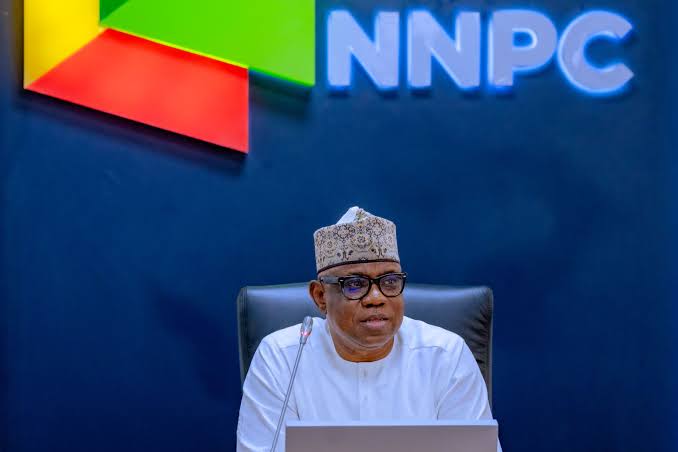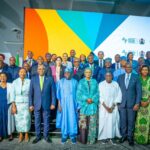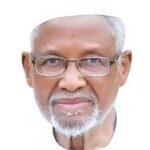NNPC: Cut Ojulari and New Board Members Some Slacks

By Bamidele Atoyebi
As public chatter intensifies over trillions supposedly unaccounted for in the Nigerian National Petroleum Company Limited (NNPC Ltd), it is crucial to separate political fiction from professional fact. The recent controversy surrounding alleged missing funds has stirred unnecessary public hysteria, much of it founded on misinformation and political undertones. Headlines of NNPC being “indebted to the tune of ₦100 trillion” or “mismanaging ₦200 trillion” are not only sensationalist but risk undermining the efforts of a newly constituted board that hasn’t spent up to four months in office.
It is essential to state the facts clearly: the new board of NNPC, including the Group Chief Executive Officer, Bayo Ojulari, and other respected professionals, was inaugurated in April 2025. These individuals’ true technocrats in every sense have not had sufficient time to be held accountable for alleged financial irregularities that date far back into previous administrations.
If indeed there are credible claims of mismanagement or missing funds as loosely suggested, then the right approach is to invite former board members, especially Mele Kyari and Chief Pius Akinyelure and his team, who presided over NNPC during the period in question. This is basic accountability logic. It is not only misleading but unjust to turn a spotlight of suspicion on a board that barely has its boots laced.
We must ask: Who is sponsoring this media campaign? What are the motivations behind pushing a narrative that deliberately ignores the chronology of appointments, responsibilities, and timelines? Why is the Senate not backing its claims with a transparent financial review instead of throwing figures into the public space without substantiation?
The answer lies in the growing discomfort among certain entrenched interests some may even call them “village people” who do not want Nigeria to make progress. They recognize the threat that capable and uncompromised leadership poses to the old order of impunity and mediocrity. They see the fresh wind of technocratic leadership at NNPC as a direct challenge to the status quo, and so, they attack it.
What is particularly commendable about this new NNPC board is not only its professionalism but the unprecedented transparency it has brought. Ojulari, a seasoned engineer with decades of experience from Shell and Renaissance Africa Energy, is already redefining standards. Within weeks of assuming office, he authorized the release of April’s operational and financial data, the first move of its kind in the company’s history. Revenues were posted at ₦5.89 trillion, with a profit-after-tax of ₦748 billion, clearly reported for public scrutiny.
Ojulari is not just leading he’s setting a new bar for what technocratic leadership should look like in Nigeria’s public enterprises. His reputation for operational brilliance and ethical leadership precedes him, and he is now leveraging that pedigree to reposition NNPC as a global energy player rooted in transparency, local content development, and investment confidence. As the engine of this transformation, he is restoring credibility and competitiveness to a company long mired in opacity.
But he is not working alone. The current board is filled with highly experienced and competent professionals who bring with them decades of impactful service in the energy industry.
Ahmadu Musa Kida, the board’s Non-Executive chairman, brings over three decades of upstream oil expertise, having served as deputy MD of TotalEnergies Deepwater Services. He is also a trained petroleum engineer with international credentials and has championed local capacity building while leading key offshore projects. His strategic and people-focused leadership is a great asset to the board.
Babs Omotowa, former MD/CEO of Nigeria LNG, under whose leadership the company generated over $40 billion in revenue and remitted $22 billion to the federal government. He led landmark projects like the acquisition of LNG vessels and the Bonny Bodo road development. A global voice in the energy space, Omotowa also served on international boards, driving Nigeria’s environmental and transparency agenda globally.
Also on the board is Engr. Yusuf Usman, a quiet titan whose leadership and achievements in Nigeria’s gas infrastructure are widely acknowledged. Starting his career at Shell before joining NNPC in 1993, he played leading roles in critical infrastructure projects such as the Calabar Ajaokuta pipeline and the OB3 gas pipeline both vital to Nigeria’s domestic gas supply strategy. As Chief Operating Officer for Gas & Power, he championed policies that doubled Nigeria’s domestic gas footprint. His reforms in procurement and contracting saved the country billions and introduced strategic clarity and fiscal discipline. Usman remains the only high-level executive from the controversial Diezani era never summoned by anti-graft agencies, a mark of unassailable integrity.
Together, these board members represent a coalition of excellence visionaries in gas commercialization, infrastructure development, corporate finance, project execution, and policy reform. Their collective background in multinationals, indigenous operations, and public governance is unmatched in the history of NNPC.
It’s also worth noting that the credibility of these individuals has never been in doubt. Among them are those who, despite serving in turbulent times, emerged without any blemish, untainted by corruption, and trusted by both public and private stakeholders.
Ojulari himself is no stranger to transformation. As Managing Director of Shell Nigeria Exploration and Production Company (SNEPCo), he led the Bonga deep-water asset to peak performance, increasing output by 20% and reducing costs by over 30%. His engineering acumen and leadership won the Bonga FPSO several accolades, including “Asset of the Year.” Post-Shell, he continued his legacy at Renaissance Africa Energy, where he steered a groundbreaking $2.4 billion indigenous acquisition of Shell’s onshore assets, making a strong case for Nigerian control in the energy sector.
Together, Ojulari and his fellow board members are charting a course that reflects President Tinubu’s confidence in their ability to reform the oil and gas sector. Their plans are ambitious yet strategic: boosting oil production to 2 million barrels per day by 2027, hitting 3 million barrels by 2030, and attracting upwards of $60 billion in investments within five years. Add to this the roadmap for revitalizing Nigeria’s refining capacity and expanding gas infrastructure, and it becomes clear: the board isn’t asleep at the wheel they are racing to get Nigeria back on track.
Let it be said clearly: this is the first time in Nigeria’s oil history that a team of seasoned professionals, not political appointees, has been given the reins of NNPC. That in itself is a step in the right direction. Instead of unwarranted criticism and phantom allegations, what they need is support, patience, and the space to implement long-overdue reforms.
Nigeria has lost enough time and resources to distractions. The Senate and other political actors must rise above opportunistic politics. They should support these new NNPC leaders, not sabotage them. A true national interest conversation would focus on reform metrics, deliverables, and transparent financial reviews, not vague accusations aimed at derailing progress.
This board is capable. The president knows it. The industry knows it. The Nigerian people should come to know it, too.
It’s time to cut Ojulari, Yusuf Usman, and the entire new NNPC board some slacks and let them work.
Bamidele is the Convenor of the BAT Ideological group and a news publisher. He sent this message from Abuja.








